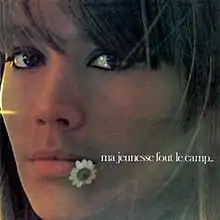Ma jeunesse fout le camp...
Ma jeunesse fout le camp… is a studio album by the French popular singer Françoise Hardy. Released in France in November 1967, on LP, Production Asparagus/Disques Vogue/Vogue international industries (CLD 720). The title is very idiomatic, but it in English its general meaning is 'My youth is slipping away'.
| Ma jeunesse fout le camp… | ||||
|---|---|---|---|---|
 | ||||
| Studio album by | ||||
| Released | 1967 (France) | |||
| Recorded | Paris, France Studio Pye, London, United Kingdom | |||
| Genre | French pop | |||
| Length | 31:30 | |||
| Language | French | |||
| Label | Disques Vogue | |||
| Producer | Asparagus Production:
| |||
| Françoise Hardy chronology | ||||
| ||||
| Review scores | |
|---|---|
| Source | Rating |
| Allmusic | |
This album was the first produced by Hardy's own production company, Asparagus Productions. Manufacturing and distribution were still handled by Disques Vogue.[2]
Track list
Except as noted, words and music were written by Françoise Hardy, and she is accompanied by the Charles Blackwell orchestra.[3]
- "Ma jeunesse fout le camp" – 3:05
Lyrics and music written by: Guy Bontempelli
First performed by: Michèle Arnaud, 1962 - "Viens là" – 2:25
- "Mon amour adieu" – 2:20
Music written by: Hasell[4] - "La Fin de l’été" – 2:35
Original title: "À la fin de l’été… (Tu sais)"
Lyrics by: Jean-Max Rivière
Music written by: Gérard Bourgeois
First performed by: Brigitte Bardot, 1964 - "En vous aimant bien" – 2:15
Accompanied by: John Paul Jones - "Qui peut dire?" – 2:05
Accompanied by: Jacques Dutronc - "Des ronds dans l'eau" – 2:25
Lyrics by: Pierre Barouh
Music written by: Raymond Le Sénéchal
First performed by: Nicole Croisille and Annie Girardot, 1967[5] - "Il n’y a pas d’amour heureux" – 2:20
Lyrics: poem by Louis Aragon
Music written by: Georges Brassens
First performed by: Georges Brassens, 1953 - "Il est trop loin" – 3:40
Original title: "Sorrow"
Lyrics and music written by: Peter Yarrow and Noel "Paul" Stookey
First performed by: Peter, Paul and Mary, 1962
French adaptation by: Daniel Hortis and Danyel Gérard[6] - "Mais il y a des soirs" – 2:10
Accompanied by: John Paul Jones - "Voilà" – 3:20
Accompanied by: Jacques Denjean - "C’était charmant" – 1:55
Editions
LP records: first editions in the English-speaking world
 South Africa, 1968: Ma jeunesse fout le camp..., World Record Club (ORL 6016).
South Africa, 1968: Ma jeunesse fout le camp..., World Record Club (ORL 6016)..svg.png.webp) Australia, 1968: Ma jeunesse fout le camp..., Phono Vox (LPV 005).
Australia, 1968: Ma jeunesse fout le camp..., Phono Vox (LPV 005)..svg.png.webp) Canada, 1968: Ma jeunesse fout le camp…, Disques Vogue/Vogue international industries (VC 6020).
Canada, 1968: Ma jeunesse fout le camp…, Disques Vogue/Vogue international industries (VC 6020). United Kingdom, 1968: Il n’y a pas d’amour heureux, United Artists Records (ULP 1191).
United Kingdom, 1968: Il n’y a pas d’amour heureux, United Artists Records (ULP 1191). New Zealand, 1968: Ma jeunesse fout le camp…, Phono Vox (LPV 005).
New Zealand, 1968: Ma jeunesse fout le camp…, Phono Vox (LPV 005). United States, 1969: Mon Amour Adieu, Reprise Records (RS 6345).[7]
United States, 1969: Mon Amour Adieu, Reprise Records (RS 6345).[7]
Reissue on CD
 France, 1995: Ma jeunesse fout le camp..., Kundalini/Vogue/Virgin Records (7243 8 40501 2 2).
France, 1995: Ma jeunesse fout le camp..., Kundalini/Vogue/Virgin Records (7243 8 40501 2 2).
Notes and references
- Allmusic review
- See the entry for Françoise Hardy on readysteadygirls.eu.
- Ma Jeunesse Fout Le Camp, overview, Allmusic. Accessed on line May 7, 2009.
- Instrumental entitled "Baby Goodbye".
- Song from the film Vivre pour vivre of Claude Lelouch. Sung in French by Annie Girardot and in English by Nicole Croisille: "Now you want to be loved" (Sonny Miller), Disc' AZ (EP1144), 1967.
- Danyel Gérard was the first performer of the French version titled "Elle est trop loin", Disc' AZ, (EP 941 Medium), 1963.
- Les titres "Qui peut dire ?" et "Voilà" sont remplacés par "Je ne sais pas ce que je veux" et "Avec des si".
This article is issued from Wikipedia. The text is licensed under Creative Commons - Attribution - Sharealike. Additional terms may apply for the media files.